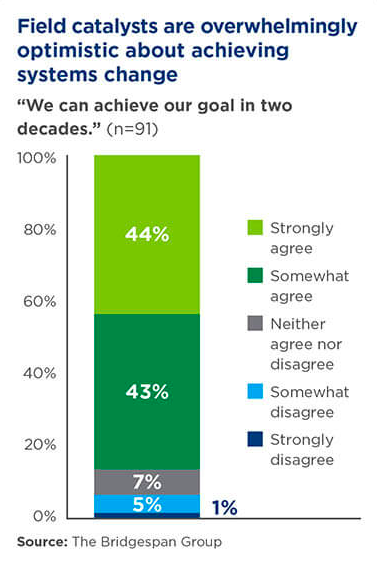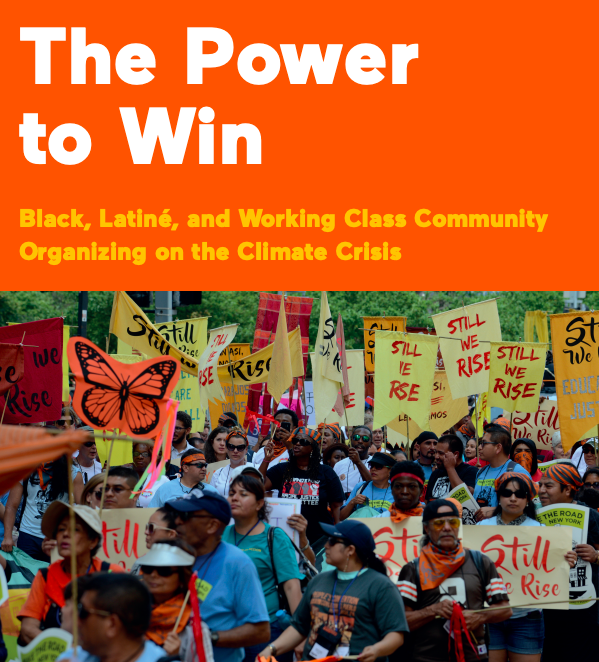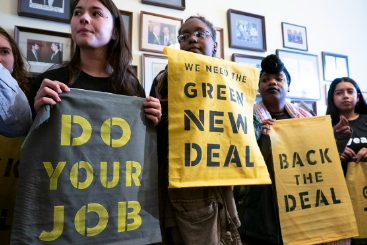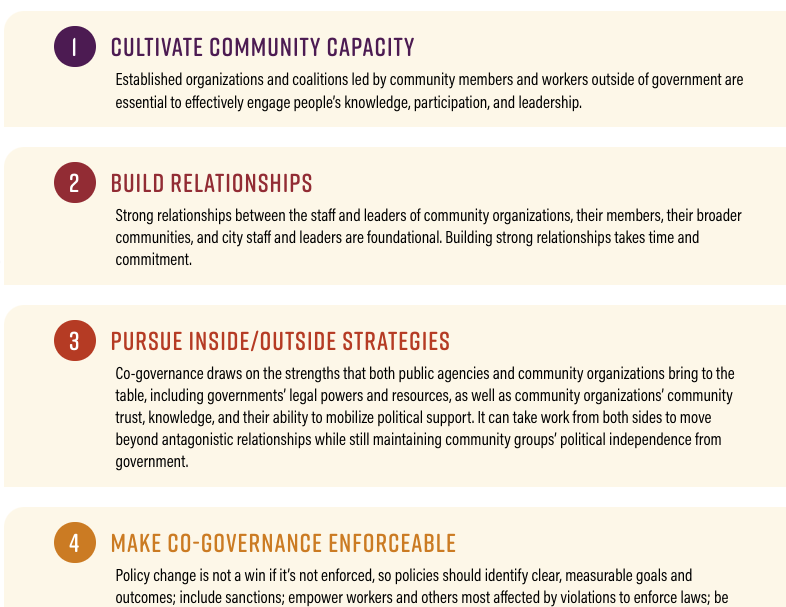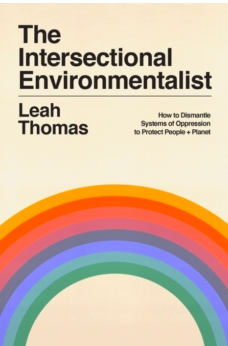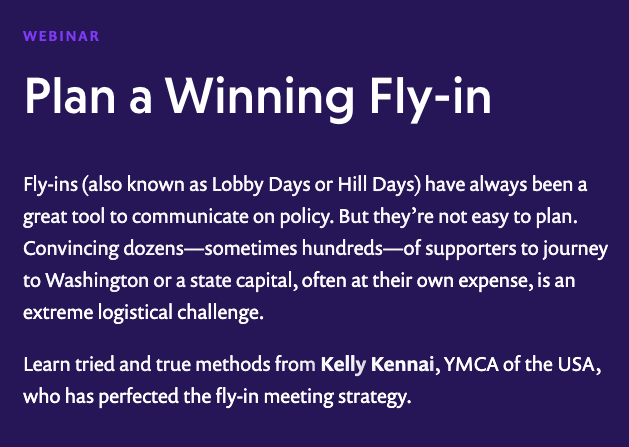Resources
Search below for resources covering the intersection of climate engagement, social science and data analytics.
RESULTS
Field Catalyst Origin Stories: Lessons for Systems-Change Leaders
Solving complex social problems offers unique challenges—here are lessons from “social-change makers” for fellow leaders. First, a critical step to build trust is to center the voices and perspectives of those most affected by inequitable systems themselves. Second, given constraints in human capacity, consider experimenting by hiring differently, deploying talent differently, and surrounding yourself with people who think differently than you. Third, measure your impact—use principles that center equity and learning, track the state of the field’s development, monitor your progress, and don’t forget the health of your own organization. Fourth, be sure to find balance between long-term visioning and planning and short-term action.
Equitable Systems Change: Funding Field Catalysts from Origins to Revolutionizing the World
Even with modest beginnings, “systems-change organizations” seek world-changing outcomes. But solving complex social problems is uniquely challenging. This resource surveyed “field catalysts” aiming for systems change across a variety of issues, including health equity, gender-based violence, climate change, and education. It found that their work could be accelerated with the right support from funders. Because these organizations consistently punch far above their weight, 87% of field catalysts believe they would achieve their systems-change goals within just two decades if provided the necessary resources and consistent support. This resource also profiles some organizations, including IllumiNative, Harambee Youth Employment Accelerator, South African National AIDS Council, Community Solutions, Health Care Without Harm, Movement for Black Lives, Families and Workers Fund, and more.
The Power to Win: Black, Latiné, and Working Class Community Organizing on the Climate Crisis
Organizing the climate crisis’ most disproportionately impacted communities is the missing ingredient to build power required to address the climate crisis. In order to meet the climate crisis and transform our society, we must scale up grassroots organizing. Organizations affiliated with the Center for Popular Democracy that are now leading some of the strongest climate justice organizing in the country include the Green New Deal Network, New York Communities for Change, Make the Road PA, One PA, CASA, the PA statewide climate table, and Florida Rising, and others. This report profiles the work of those groups and others organizing working-class communities of color into the climate movement. Organizing must be: 1) community-led and focus on issues that have tangible impacts for Black, Indigenous, Latiné, and low-income people, 2) rooted in a framework that challenges racial capitalism, and 3) intersect with other issues impacting frontline communities.
Speculative Budgeting: Resource Management for Our Futures
Presented by A Bookkeeping Cooperative and AORTA, Speculative Budgeting: Resource Management For Our Futures asks us to reimagine budgeting using speculative fiction practices. This presentation slidedeck broadens how we understand budgets as a way to manage resources to meet our visions and dreams. Using joy and visioning activities, we reinvigorate the budgeting process, a process that has typically felt stressful, oppressive, and limiting into a process centered on imagination and creativity.
How to beat the ‘fracking frenzy’ — lessons from the campaign that ended fracking in Ireland
The successful Irish anti-fracking struggle offers key insights on community power building for anti-extraction movements all over the world. In 2017, community activists in Ireland mobilized a grassroots movement that forced the state to revoke fracking company Tamboran’s license and ban fracking. The first step towards defeating Tamboran in Ireland was building a movement rooted in the local community. Out of this experience, five key “rooting strategies” for local organizing emerged — showing how the resistance developed a strong social license and built community power. First, build from and on relationships. Second, foster ‘two-way’ community engagement. Third, celebrate community. Fourth, connect to culture. Fifth, build networks of solidarity. Four key political strategies include: find strategic framings; demonstrate resistance; engage politicians before regulators; focus on the parliament.
Many in philanthropy argue that there’s not enough time to overcome systemic barriers to engaging marginalized groups—and that even trying will slow down the process of reducing climate pollution. In fact, the exact opposite is true. Make multiyear, general support grants to community-based organizations that will be engaged in developing, financing, implementing, and communicating about clean energy and other climate justice projects. Support regional hubs and coordinated networks. Fund collaborations among partners taking transformative local solutions to scale.
Co-Governing Toward Multiracial Democracy
To build an accountable, authentic, inclusive multiracial democracy, government must belong to the communities they represent and serve. To successfully “co-govern,” there are a handful of crucial steps. Cultivate community capacity: Established organizations and coalitions led by community members and workers outside of government are essential to effectively engage people’s knowledge, participation, and leadership. Build relationships: Strong relationships between the staff and leaders of community organizations, their members, their broader communities, and city staff and leaders are foundational. Building strong relationships takes time and commitment. Pursue inside/outside strategies: Co-governance draws on the strengths that both public agencies and community organizations bring to the table, including governments’ legal powers and resources, as well as community organizations’ community trust, knowledge, and their ability to mobilize political support. It can take work from both sides to move beyond antagonistic relationships while still maintaining community groups’ political independence from government. Make co-governance enforceable: Policy change is not a win if it’s not enforced, so policies should identify clear, measurable goals and outcomes; include sanctions; empower workers and others most affected by violations to enforce laws; be tailored to sectoral and local context; and transform norms and cultures of enforcement. Transform the culture of governance: Effective co-governance requires real commitment and institutional change. Public agencies need political backing, funding, and training for co-governance to succeed. Scale up and scale out: Co-governance holds tremendous potential to be scaled up across local, state, and federal governments, as well as extended into the private and nonprofit sectors. To get to scale and learn from one another as we go, we must seed new organizations, create coalitions, and build solidarity with other movements.
#BlackClimateWeek Reading List 2023
Black authors have told stories of the origins and consequences of environmental injustices, given us the richest and most comprehensive collection of poems about nature, and reimagined the future. The Solutions Project is excited to share recommendations to add to your reading list in February and all of the other months of the year. Readings include “The Intersectional Environmentalist” by Leah Thomas, “Black Joy: Stories of Resistance, Resilience, and Restoration” by Tracey Micha’el Lewis-Giggetts, “Becoming Abolitionists” by Derecka Purnell, “An Abolitionist’s Handbook” by Patrisse Cullors, and “Madam C.J. Walker’s Gospel of Giving” by Tyrone McKinley Freeman.
Plan a Winning Fly-in
Successfully meeting with policymakers requires a few key steps. The group trying to meet with their representative must select a priority issue (or issues), recruit the correct people (and a lot of them) to attend the meeting, properly schedule the meeting ahead of time, prepare the advocates in the room, and follow up with the representative’s office after the meeting. This webinar details all of these ingredients.
The North Star State has a new North Star: 100 percent clean electricity by 2040. Minnesota joined 10 other states, along with the District of Columbia and Puerto Rico, in creating laws that require a transition to 100 percent carbon-free electricity—highlighting a trend of state-level action to act on climate, create local jobs, lower energy costs, and reduce deadly pollution. MN Representative Jamie Long, Majority Leader of the Minnesota House, and advocacy group Fresh Energy executive director Michael Noble played key roles in making 100 percent clean electricity the law of the land in the state. This resource includes an interview with them about the process leading to this new Minnesota policy. A big coalition of interest groups supportive of this policy was necessary for its passage. The bill passed full Democratic support and zero Republican support. The coalition included small business, families, family-supporting jobs and labor and trade unions, environmental justice groups, environmental groups, and traditional advocates for renewable energy.
Pagination
- Previous page
- Page 5
- Next page
